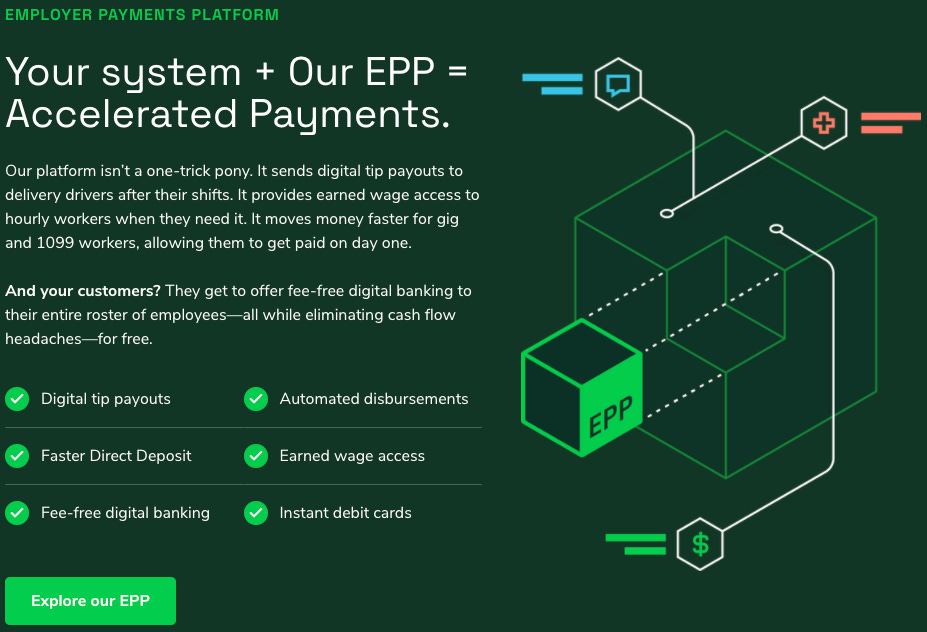Employers can now step up to help employees
$GME wasn't the only thing happening in fintech this week
Tweet of the week 🦉🏆
While a lot of focus has been on r/WallStreetBets and Robinhood, enough uninformed opinions have been tweeted so I won’t add my 2¢. For the best layman breakdown I have seen on what went on with the stock market, watch the above.
Robinhood clearly needs some media and communication guidance as the contrast to how Public.com handled its communication was 🌃 night and 🏙️ day. Maybe Avalon can help!
One game changing news piece which went under the $GME/Robinhood radar this week was Branch launching its Employer Payments Platform, helping employers provide more financial services to their employees. Check out my take in the payments section below.
If you enjoy reading this, please subscribe and share! 🙏
Funding 💸
There were 50 deals in the fintech space across the US and Europe with total investment of ~$2bn. Some highlights are below.
🇪🇺 French BNPL provider Alma has raised a €49m Series B from Cathay Capital, Picus Capital and Seaya Ventures.
🇪🇺 Italy based BNPL provider Scalapay has raised a $48m seed round led by Fasanara Capital and included Baleen Capital and existing investor Ithaca Investments.
🇪🇺 Swedish payments fintech Trustly is preparing for an $11bn IPO in Stockholm.
🇬🇧 Open banking payments company Token has raised a $15m Series B round led by Innovation Growth Ventures and included EQT Ventures and Octopus.
🇬🇧 Starling Bank is in talks with Fidelity to lead its £200m round with a ~£73m investment.
🇺🇸 NYC B2B payments company Melio raised a $110m round led by Coatue and also included Accel, Amex, Bessemer, General Catalyst, LocalGlobe and Salesforce 🦄
🇺🇸 Mainstreet raised an undisclosed amount from SignalFire which boosted the company’s valuation to $500m.
🇺🇸 Flywire is gearing up for a $3bn IPO with JPMorgan and Goldman lead bankers according to Reuters.
🇺🇸 E-Commerce checkout solution Fast raised an $102m Series B, led by Stripe with participation from Index Ventures, Sugar Capital and Susa Ventures.
🇺🇸 Robinhood raised $1bn from existing investors and drew down its credit lines from banks to help ease liquidity concerns after their eventful week.
🇺🇸 Personal financial management app Albert raised $100m in a Series C led by General Atlantic and included existing investors QED and Portag3.
🇺🇸 Check, a payroll service solution, raised a $35m round from Stripe and Thrive Capital.
🇺🇸 Stilt, a fintech targeting immigrants, raised $100m in debt from Silicon Valley Bank as it seeks to grow its lending capabilities.
🇺🇸 Fintech Dave also raised an $100m debt facility from Victory Park Capital.
🇺🇸 TCV closed a $4bn fund to invest in e-commerce, fintech, edtech and travel.
🇺🇸 Yotta Savings raised a $13m Series A led by Base10 Partners and included Clifford Asness, Core Innovation Capital, Ken Moelis, Slow Ventures and Y Combinator.
🇺🇸 Pilot raised a $60m Series C from Sequoia for its business back office automation solution.
Challenger Banking 🚀
🇪🇺 German neobank N26 has hired a new CFO as the company gears up for its IPO. The company passed 7m customers across Europe and the US recently and is set to hire 200 new people.
🇪🇺 Commerzbank is cutting 1 in 3 German jobs and closing 340 branches to focus on digitisation.
🇬🇧 UK challenger bank Zopa is now offering in-app energy switching and comparison service, powered by MoneySupermarket.
🇺🇸 Personal financial management app Charlie has added debt visualisation in an attempt to help users reduce their outstanding debt.
Traditional Banking 🏦
🇪🇺 BNP is offering Premier customers the opportunity to sign up for a fingerprint contactless card for an annual fee of €24.
🇪🇺 ING has launched a discount shopping platform, DealWise, to gather cashback deals and discounts from merchants in a single location for customers. As banks compete harder to retain customers, small value add services like this are vital. It could be the beginning of a super-app!
🇬🇧 JP Morgan is set to launch its digital consumer bank (again) in the UK with its Chase brand imminently according to Reuters. The company has hired 400 for its new venture.
🇺🇸 Capital One reported higher net income for 4Q 2020 due to a release of reserves due to better loan performance. I wonder if this is a little premature.
🇺🇸 Chase has increased its interest rate from 24% to 29.9% and increased late fees from $27 to $40 in its terms of service.
Fintech Infrastructure 🚧
🇬🇧 TrueLayer launched its PIS product, PayDirect, enabling instant payments and withdrawals with built in KYC and AML.
🇬🇧 Bud has added challenger bank Dozens to its list of customers for its AIS solution.
🇺🇸 Plaid introduced Deposit Switch, a product that makes it faster and easier to change the destination of a user’s paycheck, currently a horrid manual process.
👋 FATP Take - One of the reasons that neobanks have not become a primary bank account is due to the difficulty of switching from more established incumbents. With Plaid starting to make this easier, neobanks could see a shift of users depositing their paychecks which will increase customer stickiness and use of their financial products, boosting LTV.
🇺🇸 BofA, JP Morgan, PNC Bank, TD Bank, US Bank, Wells Faro and Truist are testing a data sharing risk assessment service to collaborate and consolidate risk evaluations of data aggregators and financial apps.
👋 FATP Take - This development is a sign of acceptance by large US banks of the CFPB’s stance that consumer data is owned by the consumer and they have rights to access it. The centralised service is provided by TruSight and IHS Markit should make it easier for banks to onboard users through data aggregation services like Plaid and Finicity.
🇺🇸 Finch and Codat are partnering to help make the process for SMBs applying for PPP easier by providing the data they have on SMBs to lenders. Finch provides payroll data whilst Coda can provide accounting data and revenue for a clearer picture on the creditworthiness of businesses.
Payments 💰
🇬🇧 Starting 15th October, Mastercard is increasing credit card interchange fees 5x for UK online purchases from the EU in a post-brexit move. Credit interchange is increasing from 0.3% to 1.5% and debit is increasing from 0.2% to 1.15% as they are no longer subject to the EU cap.
👋 FATP Take - This is a huge negative for UK merchants who now face substantially higher charges for doing business at a time when businesses are really suffering. However for companies offering alternative payment solutions such as PIS and account-to-account payments, this will drive merchants to seek alternatives. The UK Government could step in and regulate these fees itself to keep them low.
🇬🇧 TransferWise has closed a worldwide deal with Visa to expand its debit card program and multi-currency account through the Visa Cloud Connect platform.
🇺🇸 Branch launched its Employer Payments Platform, allowing its business customers to embed different financial service solutions in their offerings for employees.
👋 FATP Take - With the covid pandemic putting more strain on household financials, especially low income earners and 1099 workers who have borne the brunt of the economic impacts of covid, employers are increasingly stepping up to help. By offering employees access to their earned wages before their typical pay cycle, it prevents predatory short term borrowing. Branch’s platform offers employers the ability to offer digital tips, reimbursements, fee-free banking and earned wage access, making these products more accessible to companies who are interested in supporting their workers. You can read more about this $500bn market in a previous FATP post here.
🇺🇸 Despite contactless payments not yet becoming mainstream, Mastercard has its eyes on the future and debuted it’s “Enhanced Contactless (Ecos) technology which will allow any device to be used as a payments device.
Regulatory Corner 🔎
🇪🇺 The head of German regulator BaFin has been axed after the Wirecard scandal.
Longer reads 📜
The Road Not Taken: Stripe, Ant, PayTM & Defi - Byrne Hobart, The Diff
👋 FATP Take - Probably my favourite read this week as I gradually caught up on the many newsletters that I subscribed to. The nuance between the different approaches of Stripe, Ant and PayTM really showed how payments innovation differs depending on the existing financial infrastructure and regulatory environment in each country. This wasn’t necessarily a surprised but Byrne articulates the differences very well. It shows why Asia is leading in the payments space.
Alternative Lending: The industry’s predictions for 2021 - Daniel Lanyon, Altfi
👋 FATP Take - The pandemic has been incredibly challenging for SMEs but their rapid adoption of digital financial services should hold them, and their fintech lenders, in good stead in the future. With the economy poised to rebound when the pandemic subsides, businesses will need additional working capital and a rollover of their COVID loans which presents a great opportunity for digital lenders who have built new relationships with SMEs who came to them in their time of need. These types of relationships are not easily forgotten and in instances when traditional banks were not able to lend (or not quick enough), digital lenders like Tide, Starling Bank, Funding Circle and Cross River in the US stepped up and now own that SME relationship and can use it as a hook into selling of other SME tools. SMEs have adapted to a more digital world and that will only continue. FIntech lenders however need a level playing field which means access to government-sponsored cheaper funding to continue to support fintech’s in their efforts to revitalise the SME space. I expect consolidation with traditional banks acquiring, licensing or partnering with fintechs for their technology.
Finances on autopilot: How do we get there? - Dan Chaplin, Dawn Capital
👋 FATP Take - I have previously written about the automation of personal financial management here and Dan makes some valid points that in Europe we have started to build the fundamental blocks necessary to bring this to life. However, despite open banking, it seems like we are still a long way from this happening. The US is ahead with companies like Wealthfront and M1 Finance offering similar services, albeit in a closed loop ecosystem. Companies like Astra are innovating in an open ecosystem. With the rapid adoption of PIS and Open Banking in Europe, this could change meaningfully if more financial services are covered by PSD2. But this is a regulatory driven approach rather than market driven (like in US) and over the long term it is not clear which makes for a better end user experience. At its core, automated finance is about moving money based on users goals. Without the moving money part, it doesn’t exist. Also without users goals, it doesn’t exist. I have yet to find many companies working on the latter but Multiply.ai is one of them however.
How WallStreetBets pushed GameStop shares to the Moon - Brandon Kochkodin, Bloomberg
Alternative credit data, fair lending may take focus under Biden - Anna Hrushka, Banking Dive
How hedge fund traders known as the SPAC Mafia are driving an $80bn investment book with a no-lose trade - Eliza Haverstock, Forbes
Where social capital becomes financial capital - Michael Sidgmore
Your feedback is a 🎁, please give below 🙏
Follow me on LinkedIn and Twitter.
Michael



